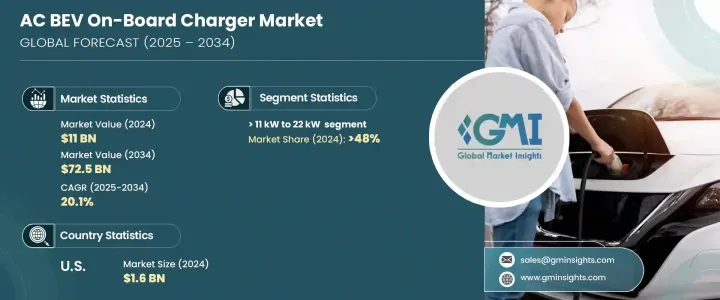PUBLISHER: Global Market Insights Inc. | PRODUCT CODE: 1721553

PUBLISHER: Global Market Insights Inc. | PRODUCT CODE: 1721553
AC BEV On-Board Charger Market Opportunity, Growth Drivers, Industry Trend Analysis, and Forecast 2025 - 2034
The Global AC BEV On-Board Charger Market was valued at USD 11 billion in 2024 and is estimated to grow at a CAGR of 20.1% to reach USD 72.5 billion by 2034. The strong momentum in this market is fueled by a sweeping global shift toward electrification, driven by ambitious climate goals, rising environmental awareness, and growing government mandates to curb carbon emissions. As the automotive landscape undergoes a massive transformation, automakers and suppliers are under immense pressure to adapt to an electrified future. The surge in battery electric vehicle (BEV) adoption has made efficient, compact, and cost-effective on-board chargers more critical than ever. As consumers demand longer range, faster charging, and better performance, on-board chargers are evolving to meet these expectations with smarter, more capable technologies. Moreover, with the EV ecosystem rapidly expanding to include residential, commercial, and fleet-based charging needs, on-board chargers are now at the forefront of innovation, helping shape a more connected and sustainable transportation future.

Stringent international regulations aimed at reducing vehicle emissions are driving the accelerating demand for electric vehicles and, consequently, advanced on-board charging systems. With governments around the world pushing for large-scale EV deployment, the need for reliable, efficient, and user-friendly charging infrastructure is surging. Technological breakthroughs in EV charging-particularly in reducing charge times, enhancing efficiency, and improving user experience-are helping make electric vehicles more accessible and appealing to a broader consumer base.
| Market Scope | |
|---|---|
| Start Year | 2024 |
| Forecast Year | 2025-2034 |
| Start Value | $11 Billion |
| Forecast Value | $72.5 Billion |
| CAGR | 20.1% |
The transition toward public charging stations and the global push to unify charging standards, such as CCS and CHAdeMO, are playing a vital role in streamlining the charging process. By resolving compatibility issues and offering greater convenience, these developments are supporting the EV transition on a larger scale. Smart charging systems are also transforming user experiences, enabling remote monitoring and control via mobile apps, scheduling off-peak charging to reduce costs, and integrating renewable energy sources like residential solar panels for greener, more sustainable EV ownership.
Based on power rating, the AC BEV on-board charger market is segmented into 11 kW, 11 kW to 22 kW, and over 22 kW. The 11 kW to 22 kW segment accounted for a 48% market share in 2024, with the 11 kW chargers being particularly favored for their affordability and design simplicity. These units typically require less sophisticated electronics and thermal management systems, keeping production costs lower than their higher-powered counterparts.
The U.S. AC BEV On-Board Charger Market was valued at USD 1.6 billion in 2024. Federal and state-level incentives, including tax benefits for high-power charger installations, have significantly spurred EV sales. This growth has led manufacturers to prioritize innovations in faster and more efficient charging technologies to align with evolving consumer expectations.
Key players in the market include Alfanar Group, STMicroelectronics, Ficosa International SA, Delta Energy Systems, Toyota Industries Corporation, Valeo, Xepics Italia SRL, BorgWarner Inc., BRUSA Elektronik AG, Powell Industries, Eaton Corporation, AVID Technology Limited, Delphi Technologies, Bell Power Solution, Kirloskar Electric Company, Current Ways Inc., nonelectric AG, and Stercom Power Solutions GmbH. These companies are investing heavily in R&D to introduce high-performance, cost-effective solutions that support fast charging and renewable energy integration. Strategic collaborations with automakers and energy providers are helping these players strengthen their market presence and keep pace with the rising demand.
Table of Contents
Chapter 1 Methodology & Scope
- 1.1 Market definitions
- 1.2 Base estimates & calculations
- 1.3 Forecast calculation
- 1.4 Data sources
- 1.4.1 Primary
- 1.4.2 Secondary
- 1.4.2.1 Paid
- 1.4.2.2 Public
Chapter 2 Executive Summary
- 2.1 Industry synopsis, 2021 - 2034
Chapter 3 Industry Insights
- 3.1 Industry ecosystem analysis
- 3.2 Regulatory landscape
- 3.3 Industry impact forces
- 3.3.1 Growth drivers
- 3.3.2 Industry pitfalls & challenges
- 3.4 Growth potential analysis
- 3.5 Porter's analysis
- 3.5.1 Bargaining power of suppliers
- 3.5.2 Bargaining power of buyers
- 3.5.3 Threat of new entrants
- 3.5.4 Threat of substitutes
- 3.6 PESTEL analysis
Chapter 4 Competitive Landscape, 2024
- 4.1 Strategic dashboard
- 4.2 Innovation & sustainability landscape
Chapter 5 Market Size and Forecast, By Rating, 2021 - 2034 (Units, USD Billion)
- 5.1 Key trends
- 5.2 < 11 kW
- 5.3 > 11 kW to 22 kW
- 5.4 > 22 kW
Chapter 6 Market Size and Forecast, By Region, 2021 - 2034 (Units, USD Billion)
- 6.1 Key trends
- 6.2 North America
- 6.2.1 U.S.
- 6.2.2 Canada
- 6.2.3 Mexico
- 6.3 Europe
- 6.3.1 Norway
- 6.3.2 Germany
- 6.3.3 France
- 6.3.4 Netherlands
- 6.3.5 UK
- 6.3.6 Sweden
- 6.4 Asia Pacific
- 6.4.1 China
- 6.4.2 Japan
- 6.4.3 India
- 6.4.4 South Korea
- 6.4.5 Australia
- 6.5 Middle East & Africa
- 6.5.1 Saudi Arabia
- 6.5.2 UAE
- 6.5.3 South Africa
- 6.6 Latin America
- 6.6.1 Brazil
- 6.6.2 Argentina
Chapter 7 Company Profiles
- 7.1 Alfanar Group
- 7.2 AVID Technology Limited
- 7.3 Bell Power Solution
- 7.4 BorgWarner Inc.
- 7.5 BRUSA Elektronik AG
- 7.6 Current Ways Inc.
- 7.7 Delphi Technologies
- 7.8 Delta energy systems
- 7.9 Eaton corporation
- 7.10 Ficosa International SA
- 7.11 innolectric AG
- 7.12 Kirloskar Electric Company
- 7.13 Powell Industries
- 7.14 Stercom Power Solutions GmbH
- 7.15 STMicroelectronics
- 7.16 Toyota Industries Corporation
- 7.17 Valeo
- 7.18 Xepics Italia SRL




